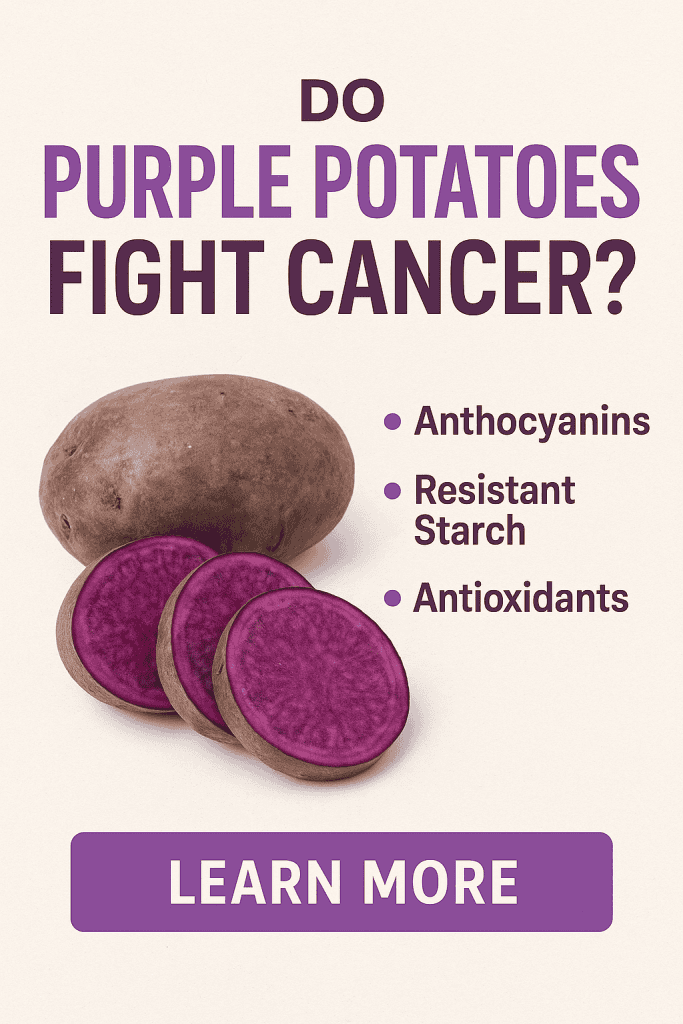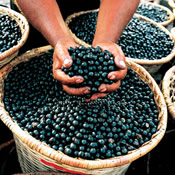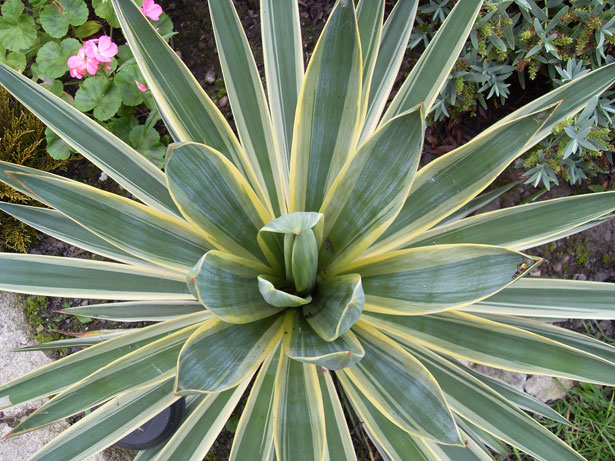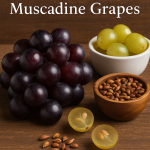
It’s a bold claim, but one that’s starting to get attention in the nutrition science world. Purple-fleshed potatoes, with their vibrant color and high anthocyanin content, may have cancer-fighting potential at least according to early laboratory and animal studies.
So, do purple potatoes fight cancer? Let’s take a closer look at what researchers have discovered and what it could mean for your health.
The Research on Purple Potatoes and Cancer
A Penn State University study explored the impact of baked purple-fleshed potatoes on colon cancer stem cells. The results were intriguing:
- Stem cell suppression: Compounds in purple potatoes reduced the growth of colon cancer stem cells in lab tests.
- Cell death (apoptosis): These same compounds encouraged cancer stem cells to self-destruct.
- Animal studies: Mice that consumed baked purple potatoes had lower markers of colon cancer stem cells and fewer tumors.
Scientists believe the cancer-fighting effect may come from a unique combination of anthocyanins (the purple pigments), chlorogenic acid, and resistant starch. Resistant starch is particularly interesting because it ferments in the colon into butyrate, a fatty acid with anti-inflammatory and anti-cancer effects.
How Many Purple Potatoes Would You Need?
The Penn State researchers estimated that the human equivalent would be about one medium to large baked purple potato per day. While this doesn’t mean purple potatoes are a prescription for cancer prevention, it does suggest that regular consumption could be beneficial as part of a balanced diet.
And beyond their unique cancer-fighting compounds, eating one medium purple potato also provides:
- Calories: ~130
- Carbohydrates: ~30 g (with ~3 g of fiber)
- Protein: ~3 g
- Vitamin C: ~20% of your daily recommended intake
- Potassium: ~15–20% of daily needs (important for blood pressure)
- B vitamins: Small amounts of B6, thiamin, and niacin
- Anthocyanins: The purple pigments, with antioxidant activity not found in white potatoes
So, one purple potato a day can contribute valuable nutrients to your diet while also delivering those unique phytochemicals being studied for cancer protection.
Purple Potatoes vs. Purple Sweet Potatoes
When asking “Do purple potatoes fight cancer?” it’s important not to confuse them with purple sweet potatoes.
- Purple-fleshed potatoes (Solanum tuberosum) are true potatoes from the nightshade family.
- Purple sweet potatoes (Ipomoea batatas) are from a completely different family but are also high in anthocyanins.
Both have health benefits, but the Penn State cancer research specifically studied purple-fleshed potatoes, not sweet potatoes.
Limitations of the Research
While it’s tempting to think purple potatoes are a miracle food, here’s what to keep in mind:
- The current evidence is preclinical—studies in lab dishes and mice, not humans.
- There are no human clinical trials yet proving purple potatoes prevent or treat cancer.
- Purple potatoes should be enjoyed as part of a diverse, colorful diet rich in fruits, vegetables, legumes, and whole grains.
How to Add Purple Potatoes to Your Diet
If you’d like to eat more purple potatoes for their potential cancer-fighting compounds, here are some tips:
- Find them: Look in farmers’ markets, specialty stores, or heirloom potato sections in grocery stores.
- Cook smart: Baking and roasting help preserve anthocyanins better than boiling.
- Try recipes: Roast them with olive oil and rosemary, mash them for a colorful twist, or use them in a chilled potato salad.
Final Thoughts: Do Purple Potatoes Fight Cancer?
The early evidence says purple potatoes may help reduce colon cancer risk by targeting cancer stem cells, lowering inflammation, and delivering powerful antioxidants. But more research, especially in humans, is needed before we can say for sure.
Until then, adding purple potatoes to your plate is a tasty way to boost nutrition—and maybe gain some extra protection along the way.
A Little Bit Deeper Research
There is so much to learn in the world of resveratrol, antioxidants, superfoods and wine. This is the place to start, no matter what, if you indeed are looking to maximize your health and live longer.
 |
Does Resveratrol Extend Ones Lifespan? Harvard Medical School and the National Institute on Aging report that a natural substance found in red wine, known as resveratrol, offsets the bad effects of a high-calorie diet |
 |
Yucca Plants: Pots of Gold Yucca plants are one of those things Mother Nature stuffed with resveratrol. |
 |
Health Benefits of Drinking Wine The health benefits of drinking wine come from the chemical makeup of the wine, not necessarily the alcohol. |
